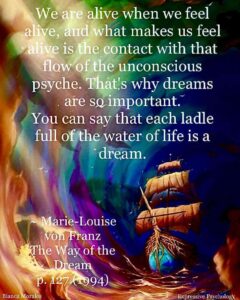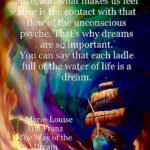
Here’s a spiritual truth I’ve learned through personal experience. Without self-knowledge, all the offerings of organized religion — group worship, teachings, scriptures, retreats, sacraments, guidance from helpful religious professionals — and all the correct beliefs, good intentions and divine interventions we can experience are not enough to transform us into spiritually mature beings. Why? Because there is no such thing as spiritual maturity without psychological awareness! You can no more separate your spiritual self from the rest of your psyche than you can separate your right brain from your left and still be a whole, balanced human being.
In A Path With Heart, Jack Kornfield tells the story of how he spent 10 years, many of them as a Buddhist monk, in systematic spiritual practices conducted primarily through his mind. Having had visions, revelations, and many deep awakenings and new understandings, this holy man returned to the United States to work and continue his studies in graduate school. To his surprise, he discovered that his years of meditation had helped him very little with his feelings or human relationships. In his words,
“I was still emotionally immature, acting out the same painful patterns of blame and fear, acceptance and rejection that I had before my Buddhist training; only the horror now was that I was beginning to see these patterns more clearly. I could do loving-kindness meditations for a thousand beings elsewhere but had terrible trouble relating intimately to one person here and now. I had used the strength of my mind in meditation to suppress painful feelings, and all too often I didn’t even recognize that I was angry, sad, grieving, or frustrated until a long time later. The roots of my unhappiness in relationships had not been examined, I had very few skills for dealing with my feelings or for engaging on an emotional level or for living wisely with my friends and loved ones.”
Many of us have known spiritually-oriented people who think very well of themselves yet are arrogant, mean-spirited, impatient, intolerant, critical or unloving. This common phenomenon is partly why Freud was so critical of religion. He must have asked himself many times how people who professed to love God could be so hateful to their families and neighbors; how such lofty ideals could co-exist with such lousy relationships. In the face of this perceived hypocrisy he dismissed humanity’s spiritual nature and focused on understanding the sexual instinct, the repression of which he believed to be the true source of our problems.
It would take Freud’s maverick mentee, Carl Jung, to discover the fundamental reality of our spiritual natures and understand that they cannot be fully activated and empowered unless we take our inner lives seriously and commit ourselves to owning and integrating our disowned qualities — instincts, emotions, hidden motivations, archetypal inheritance, everything. Jung had learned for himself that neither psychological nor spiritual dogma can heal our souls and transform us into spirit persons: only consciousness can do that.
The work of this spiritual and psychological pioneer has made all the difference in my life. I’d like to recommend two sites to anyone interested in learning more. For information about how you can start a Centerpoint study group write to: centerpointec.com For a list of Jungian books you can use to begin your own program of study, check out Inner City Books. I’m pretty sure you’ll never regret it.
Healing the Sacred Divide can be found at Amazon and Larson Publications, Inc. Ebook versions of The Bridge to Wholeness and Dream Theatres of the Soul are at Amazon, Kobo, Barnes and Noble, Smashwords, and Diesel Ebooks

A Lesson on Aging
I’m so happy to be back in the mountains. I love the weather, the trees, the birds, the rushing creek, the flowering bushes. The beauty.





21 Responses
…Hello Jean … this small extract from your insightful post above resonates strongly with how I experience spiritual growth as I age, and connects more and more with my real world … thank you …
… ‘there is no such thing as spiritual maturity without psychological awareness! You can no more separate your spiritual self from the rest of your psyche than you can separate your right brain from your left’ ….
Regards, Andi
Yes, Andi, it took a long time for me to learn this simple lesson. I had no idea what “The kingdom of God is within” meant. I thought it meant I would somehow become spiritual by “deciding” to be spiritual and praying and memorizing Bible verses and using my will power to be “good” and do “good” things. I thought all I needed was will power. So from the age of 17 when I had my first “awakening” experience that convinced me of the reality of Spirit, I tried everything to connect with it…..everything, that is, except waking up to my inner realities and loving myself with all my flaws and living my life with authenticity and integrity. When I stumbled onto that understanding is when I began to grow. And yes, I’m very much still in the growing, still connecting my inner life with my outer one, still trying to figure out who I am, to be transparent and real. This is how I have found and continue to find spiritual meaning. The idea of becoming psychologically aware sounds so simple, yet is horrendously difficult for the ego to learn. Blessings, Jeanie
Hi Jean….I agree with Andi. I have mentioned your statement to several friends…’there is no such thing as spiritual maturity without psychological awareness.’ It is as if by sharing it, I am inviting a dialogue and intending to keep this awareness forefront in mind.
Quite frankly, it is one of the most powerful statements that I have ever heard. It [and the whole concept] keeps circling around in my mind. To realize that this is a life long walk in awareness–waking up to our.selves. The many layers of ‘catching’ thoughts, fantasies, judgments. The list goes on…..stretching for individuation and getting caught up in human stuff.
For my thesis I did some research with Carl Jung, Carl Rogers, and Joan Erikson. Going now to the Inner City Books site, I felt overwhelm….realized that I did not know where to start! Maybe it is A Path with Heart that I want to read.
Thank you for a most powerful and empowering post.
Heartfelt regards,
Tanene
Dear Tanene,
I’m so thrilled to know you’ve found meaning in this statement. I, too, find it to be profound. Like you, I’ve received enormous help from many books published by Inner City, especially books by Jungians about working with our dreams. It may actually have been Freud who said that dreams are the royal road to the unconscious, and I completely agree. Shedding light on the unconscious, whether through dreamwork or meditation or psychotherapy, or active imagination, etc., and applying what we find there in our daily lives is how we learn to think psychologically and grow spiritually.
You are very welcome. Thank you for writing, and blessings on your inner journey. Jeanie
Tanene, I’ve just returned from a long trip and re-read your comment and realized I misread the part about your being overwhelmed by the list at Inner City Books. May I suggest that if you’re interested, you might order my first two books (The Bridge to Wholeness and Dream Theatres of the Soul) from Amazon. They follow my learning through the early stages of my own journey, plus both have annotated lists of books at the end that tell you what I liked about them and how they helped me. Best wishes, Jeanie
Jeannie,
I think that this “centerpoint” is what I am looking for.
Once again, thank you for bringing another ray of light into my life.
CC
Hi CC,
Do look for a Centerpoint group! It used to be that they were fairly common among Episcopaleans….but if you can’t find an existing group you can always start one with 3 or 4 other like-minded people. I hope you’ll let me know if it happens! Jeanie
HI, Jeanie. As always, I enjoyed this blog entry. I wanted to tell you that I tried to email centerpointec@gmail.com, and got the email returned. Do I have that address correct? Keep on blogging, wise woman!
Hi Phyllis,
Thank you, sweet lady, not only for the kind words but also for the ‘heads up’ about the link. To check it out I just Googled “Centerpoint, Jungian psychology” and this site came up. http://www.centerpointec.com/ I clicked on it, and it appears to have all the info anyone would need to start a group. It didn’t click on all the tabs on the home page, but it looks like it’s operative. This one is slightly different because it doesn’t have the gmail address. Hopefully, if you have questions someone at the site can answer them. I do know that there was some sort of split between the leadership of the old and new organizations (even Jungians have s!), so what you want is a site that has the tapes and written lessons and can send them to you. I’m hoping this is the one.
There is a nominal fee. Plus, someone needs to be responsible for organizing the group and having the tapes sent to them. And then they have to send them back. (In the late 80’s when I took the course—first Questpoint, then Centerpoint, everything was on tape, plus you got a big notebook with the transcripts and extra activities for the group to do. I don’t know if they’re translated into CD’s now or not, but it not, it’s worth it to invest in a tape player! You can buy them at Walmart!)
Let me know if this works! I do hope you can get a group going. It was life-changing for me. But then, I took it seriously and did dreamwork on the side, read lots of books, etc.
Thanks so much, Jeanie. Sorry to be tardy replying-too much company. I will investigate. The hardest part will be finding interested parties. Thank goodness for my analyst, my own centerpoint guide.
I love this reminder of the need for both psychological and spiritual work. One of my teachers Paul Brunton called it the Long Path and the Short Path. Both needed. Your words remind me of a quote from John Tarrant, a therapist, Zen master, and author, on the cover of Shambala Sun: “You are perfect the way you are … and you could use a little improvement.” Perfect from the most spiritual perspective, but psychological improvement needed. Thank you for sharing your wisdom.
With gratitude, Elaine
I love Tarrant’s quote. It’s perfect!! 🙂 Thanks, Elaine
This is brilliant….any way to post it on FB? Aloha!
Sent from my iPhone
>
Thank you, Elizabeth. My posts are always automatically posted to FB when they’re published. You should be able to find it on my FB page!
I am grateful for all of your posts, and like many who have already commented, connect so deeply with the quote, “there is no such thing as spiritual maturity without psychological awareness.” I was fortunate to explore both paths concurrently during my own dark night(s) of the soul…such satisfying and fascinating work we are called to do!
Thank you, also, for the welcome recommendations 🙂
Terri
Responding to t2van’s comment on the fortune of learning two paths concurrently: In 1967, my teacher Anthony Damiani started his young hippie students on Jung classes one night a week and a second class on an English philosopher Paul Brunton. We began with Brunton’s book ‘The Hidden Teaching Behind Yoga. Most of us were Cornell students & politicos. Some were Ithaca College students. Some were local people. I thrived on weekly three-hour classes on Jung. We studied hard. We worked with our dreams and lives to understand them with Jungian ideas. Anthony was an exciting but practical teacher. We were fascinated with reflecting on ourselves psychologically and learning this exciting psychological language. Meditation instruction began slowly but evolved into 50 minute meditations six nights a week. We listened to music before meditation..
Thanks for this description of your work, Elaine. I had no idea how wonderful your teacher was! You and Vic were so fortunate to have found him…a real life-changer!
You’re so welcome, Terri. Thank you for the affirming words. This “satisfying and fascinating work” has been the adventure of a lifetime for me! Jeanie
Sorry, my respose to you showed up beneath Elaine’s comment. 🙂
Hi Jean,
What a WISE piece! Thank you. I have found that if I am willing to “do the work” in shattering illusions and facing parts of myself I don’t want to acknowledge, my meditation actually deepens. Gaining psychological awareness, although at times quite painful, helps me be more present in my daily life, not constantly longing for the mystical experiences that I chased so feverishly when I first glimpsed them. When you begin to deal with yourself, mystical experiences in meditation are no longer just another escape tactic, but a spontaneous experience.
One of my deepest meditative experiences came after my first dream analysis session, a session which was extremely uncomfortable for my ego. I left the session tense and wound up, feeling quite broken, yet I woke up the next day with more compassion for the suffering of others, and with an awareness, that yes, we would all be better off if we were willing to do the work, and embrace all aspects of the journey – even the less pleasant parts.
I can tell when I am slipping back into illusions and ego-consciousness, and not dealing with my feelings, because I start chasing mystical experiences, and ironically, my meditation gets shallower and less fulfilling.
Thank you for your wisdom, and for continuing to show up for all of us.
Peace,
Amanda
PS. Have you read any of Arwind Vasavada’s work? He was a Jungian analyst who also believed deeply in the Indian tradition of the Guru and I find his thoughts on “Jung as Guru” to be incredibly fascinating.
Hi Amanda,
Yes, I’ve had the same experience with meditation as a very valuable aid to inner work, but not a substitute. Thanks for sharing how you can tell when you’re slipping into illusions and ego-consciousness; that’s very helpful information!! I don’t know Arwind Vasavada’s work but he sounds like someone I need to know! Many thanks for writing, and blessings to you! Jeanie